- Auditor reports: Monstrous corruption involving EU funds
UPDATE: OVER 0.5 BLN BGN OF EU FUNDS EMBEZZLED THROUGH SOCIAL MINISTRY
- 30 March 2023 - CORRUPTION SCANDAL WITH SUSPICIONS OF ESPIONAGE
BULGARIAN GOLDEN PASSPORT. SCANDAL IN URUGUAY WITH A COLONEL FROM THE RUSSIAN INTERIOR MINISTRY
- 2 March 2023 - Bivol’s findings - ignored for months
Bivol exposed our secret weapons in Ukraine; Petkov and Ninova denied it
- 19 January 2023
Three Bulgarian companies have been importing phosphates from the Syrian Arab Republic, whose president Bashar Assad and his ministry of oil have been under US sanctions since 2011 and under EU sanctions since 2012. This is revealed by an international investigation by journalists from the Organized Crime and Corruption Reporting Project (OCCRP), Syrian Investigative Reporting for Accountability Journalism (SIRAJ), Mykolaiv Center for Investigative Reporting, Centre for Investigative Journalism Serbia (CINS), RISE Project – Romania, Investigative Reporting Project Italy (IRPI), Lighthouse Reports and Bivol, published yesterday in several countries. In Bulgaria three companies were found to have imported phosphates from Syria by sea since 2011. Those companies were Agropolychim, Afer Bulgaria and Fertix. In 2021 – 2022 the only importer of Syrian phosphates was the small company Fertix owned by Radostin Radev.
A ‘Bloody’ Trade: Inside the Murky Supply Chain of Syrian Phosphates into Europe
It should be recalled that in 2008 Agropolychim was already publicly exposed for their unethical imports from Western Sahara and in 2021 their carbamide from Ukraine was found to be the cargo on the infamous Vera Su ship that got stuck near Varna. The National Revenue Agency (NRA) has informed us of existing documented administrative violations on behalf of Fertix and its linked companies, as well as outstanding tax payments. Radev assured Bivol that he had performed all due checks on his suppliers in Syria and made sure they were not on the EU sanctions list.
Among his possible clients is EuroChem Agro Bulgaria, which was until three months ago the sole property of Russian oligarch Andrey Melnichenko. He was placed under sanctions in the EU and the UK in March 2022 because of the war in Ukraine.He then gifted his shares to his wife, who was later also placed on the EU’s sanctions list in June. Well-known oligarchs, such as the sponsor of Ukraine’s ex-president Victor Yanukovych Dmytro Firtash and the Russian billionaire from Putin’s circle Genadiy Timchenko, are involved in the production and distribution of phosphates under the protection of Bashar Assad.
In 2011 the war in Syria began. In 2012 the USA and the EU introduced massive sanctions packages on the export of petrol products from the Syrian Arab Republic. The purpose of those sanctions was to limit any financing for Bahsar Assad’s dictatorial regime.
Phosphate mine in Syria. Since 2015 most of these sites have been controlled by Russian companies. (Photo: Al Estiklal Newspaper)
The list of sanctioned individuals includes persons from the Syrian president’s entourage such as the oil industry minister at the time as well as his successors, who are also in charge of phosphate production sites.
Whose imports, how much and when?
Three Bulgarian companies have imported phosphates from the Syrian Arab Republic in the last 9 years after EU sanctions against Bashar Assad were introduced. Beside the largest producer of fertiliser in Bulgaria and on the Balkans – Agropolychim, the other two companies are not known to the general public.
Those are Afer Bulgaria and Fertix Ltd, Bivol found out. According to the chart provided to us by the Customs Agency under the Access to Public Information Act, no Syrian phosphates were imported into Bulgaria in the interval 2015 – 2021.
In 2021 and 2022, however, imports were renewed, the importer now being a small single-owner company named Fertix Ltd, registered in the city of Varna. Bivol contacted Fertix owner Radostin Velinov Radev, who in 1995 was working for Agropolychim.
In reply to Bivol’s questions Radev denied his company was buying phosphates from any sanctioned provider in Syria. “Before starting this business I made all the necessary checks, carried out all due diligence procedures, and I can therefore guarantee that the companies I work with are not on the EU’s sanctions list,” he said.
When asked if he was selling the phosphates to Agropolychim or other major consumers like EuroChem Agro, he declined answering the question, saying that was “sensitive commercial information”.
„At present I do not recall selling phosphate ore to EuroChem or if I ever did, they were small quantities.”
„I have purchased fertiliser phosphates from them before, I do not do it at present,” he commented further on his transactions with EuroChem.
When asked how his small company with its revenues of just 2,399 BGN in 2017 and 32,000 in 2018 suddenly managed to raise $1.7 million in 2021 for the purchase of phosphates from Syria, he explained that the money came from “bank loans” and “other financing that had been secured”.
In February 2019, according to the Daxy business registry database, Fertix was under a going concern pledge with Societe Generale Expressbank. And in October 2019 it suddenly raised its capital to 500,000 BGN.
According to data received under the Access to Public Information Act from NRA executive director Rumen Spetsov, Fertix had been served with one administrative violation act after a total of 13 inspections.
It had no outstanding payments to the NRA. Two other companies owned by Radostin Radev, however, – Ferti Trans Ltd. and Ivkal Ltd. – had outstanding amounts to pay, according to the NRA.
„At present I can guarantee that I have no financial obligations”, Radev said.
The company Belor Bulgaria, where Radev was board member years ago, currently has former deputy agricultural minister Preslav Plamenov Borissov on its board, Bird.bg‘s database on politically exposed persons shows. In 2010 he was Miroslav Naydenov‘s deputy but resigned after Boyko Borissov, prime minister at the time, said he was not happy with his work.
The Fortuna freighter delivering phosphates to Varna on 25 June 2021 (Source: OCCRP)
„Unofficial explanations said he had been removed due to a conflict of interest and for his proposals to amend agricultural land and wheat storage legislation in ways that would have benefitted his family’s business. His father Plamen Borissov operates 40,000 decares of grain fileds in the Dobrudja region and his company Defco owns the biggest grain processing facility in North-East Bulgaria. At the same time his brother Martin Borissov operates 10,000 decares of fields in the Vratsa region,” Mediapool news site reported at the time.
A few years later, however, he became a MEP (2013-2014) representing GERB/ENP. According to NRA data obtained by Bivol, Belor has been found to have committed two administrative violations as a result of a total of 26 inspections by the tax authority. The current official owner of the company is the Estonian and German citizen Rainer Konrad Kraus.
Agropolychim and its former state security agents imported directly from Syria until 2015
Among all phosphate importers into Bulgaria only one company is widely known to the public: Agropolychim. In 1999 the process of privatisation of the plant was started. It was completed in 2004 when the shares held by the Ministry of the Economy and Energy were bought up. Belgian citizen Philippe Rombaut, the current CEO of the company, then stepped in as co-investor and board member.
In 2000 the plant announced it was resuming its import of phosphates from the Middle East, chiefly on contracts in Syria and Jordan, Money.bg wrote at the time, quoting a press release on behalf of the company, in which no specific companies were named.

Photo: The ship that carried phosphates from South Sahara to Varna (Photo: Western Sahara Resource Watch)
Two former board members have been exposed as agents of the communist regime’s state security services: Christo Dimitrov Petrov (a partner in 5 companies), who was known as secret collaborator Ognyan, and Martin Georgiev Martinov (partner in 3 companies), a.k.a. agent Mihaylov.
In 2008 Agropolychim found itself at the centre of a major scandal, when the international watchdog Western Sahara Resource Watch (WSRW) sounded the alarm about
WSRW was referring to the export of phosphates carried by a Turkish ship operator to Varna, where Agropolychim also have their loose cargo terminal – their subsidiary Grain Terminal Varna West.
At least two communist regime state security agents have been found among the company’s former board members: Christo Dimitrov Petrov (a partner in 5 companies), who was known as secret collaborator Ognyan, and Martin Georgiev Martinov (partner in 3 companies), a.k.a. agent Mihaylov.
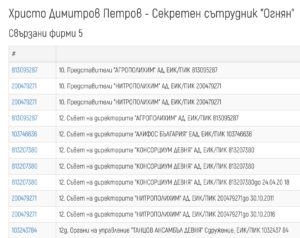
Photo: Christo Petrov – secret collaborator “Ognyan” and Martin Martinov – agent “Mihaylov” (Source: The Committee for disclosing affiliation to the former security services COMDOS / Bird.bg)
Today Agropolychim is a major beneficiary of government subsidies and EU funds. Just over the last two years the company has received over 1.07 million BGN in corona subsidies (see excerpt), Bivol’s investigation found.
In the summer of 2021 a scandal erupted around the Vera Su ship, which according to Bivol’s sources, as well as the online news outlet Dnevnik, was carrying carbamide from the Ukrainian port of Yuzhny to Varna West Port under commission by Agropolychim.
The sender of the shipment was one of the largest fertiliser producers in Ukraine – Agro Gas Trading (AGT), our Ukrainian OCCRP partner investigative outlet Слiдство.iнфо found out in response to Bivol’s request. AGT have their main offices in two places – one of the most expensive business centers in the Parus skyscraper in Kyiv and in the city of Bila Tserkva in the Kyiv region.
According to an investigation by our colleagues at Ukrainian newspaper “Економична правда” („Ukrainian Pravda“), the company claims to be the biggest provider of carbamide to the Odessa Port Plant (Одесский Припортовый Завод – OPP)“ and is linked to the former head of the State Property Fund of Ukraine – Igor Bilous.
Behind the company is a Scottish Offshore firm named Cortex Corporate LP, registered at an address where 31 other companies are also registered. The offshore firm, which is the current owner of the Ukrainian company AGT, was founded on 4 April 2017. Its beneficiaries are Abigail Silvan and Indira Williams from the Caribbean island country of Grenada.
“Bilous is considered to be part of the team around the former head of the Ukrainian presidential administration Boris Lozhkin, Economichna Pravda writes. Lozhkin held the post during the first two years of Petro Poroshenko‘s term in office – in the interval 2014-2016.
After that time the Ukrainian entrepreneur and media mogul (former publisher of Forbes Ukraine and other print media) was appointed by Poroshenko to the position of chairman of Ukraine’s National Investment Council. “There is a trail from AGT to the president’s administration”, Economichna Pravda wrote at the time, pointing out that within months the company became the exclusive provider to the OPP.
In a letter to Bivol, Agropolychim claimed they procure phosphates “from a number of providers in different parts of the world”, at the same time “duly declaring each shipment with the relevant authorities in full compliance with the law.”
In view of potential future phosphate shipments from Syria, Agropolychim asked for “official advice from various Bulgarian and foreign institutions (including the Ministry of Foreign Affairs, the Ministry of the Economy, the Bulgarian Customs Agency, the Minisrty of Foreign Affairs of Belgium, the US State Department, the European Commission) and a specialised private legal office.”
“We received written replies classifying phosphates from Syria as goods that are not subject to a sanctions regime imposed by the USA of the EU.“
On behalf of US authorities we received a letter ref: SY-2020-366453-1 dated 13/10/2020 from the Department of The Treasury, Washington, D.C., which in its paragraph pertaining to sanctions states the following:
„To the extent, your proposed activities do not involve U.S. persons, or U.S. owned or controlled foreign entities, including financial institutions, do not have any nexus to the United States, a specific license from OFAC is not required.”
“We also received a concrete answer from the Ministry of the Economy and we were referred by the EU Commission to the so-called EU Sanctions Map, where information on goods subject to EU sanctions can be found.”
In the letter Agropolychim admit that they have purchased phosphates originating from Syria at various times in the past, including after the beginning of the civil war in 2011.
„Agropolychim has never purchased phosphates under any contracts with the Syrian Arab Republic.”
„We do not maintain and have never maintained any trade relations with companies, organisations, governments, banks or individuals subject to EU and US sanctions“, says the company’s reply to our question concerning the import ban on behalf of the US Department of the Treasury.
„The reasons we stopped importing phosphates from Syria are of a manufacturing and commercial nature rather than political or regulatory. “
According to Agropolychim, “in Europe there are producers of fertiliser in at least 9 countries who also rely solely on imported phosphates, including originating from Syria.”
„In 2021 we purchased about 550,000 tonnes of phosphates from a number of suppliers and of various origins, amounting to over 70 million USD in total,“ the letter continues.
Agropolychim declined answering Bivol’s repeated questions whether they were purchasing phosphates from Fertix.
Agropolychim‘s attempts to distance themselves from the phosphate shipments coming from Syria have not been successful.
„We buy phosphates as raw material mainly from Syria”,
where they used to be cheapest but when the embargo was introduced, it wasn’t possible to do that any more, Vassil Alexandrov, CEO of Agropolychim at the time, said in a 2013 interview for Capital Daily.
In his words “the difference between the Syrian and Russian phosphates, which are nearest to us, is about sixfold.” Alexandrov admits that “given the amounts we are using – 50-60 thousand tonnes a month – that is a lot.”
At the same time another company, Afer Bulgaria Ltd. (based in Varna), which also imported Syrian phosphates to Bulgaria, is clearly part of the Agropolychim group. It is mentioned on the fertiliser giant’s website and over the years some of their board members have been the same. The single owner of the company’s capital is an offshore firm from the British Virgin Islands.
Putin’s oligarch Andrey Melnichenko – the man behind EuroChеm Agro Bulgaria
Until 2012 Radev himself says he was manager of Agricola Bulgaria, whose sole owner was Agrium Europe S.A., registered in Belgium and owned by Canadian fertiliser producer Agrium Inc.
In 2017 Russian billionaire Andrey Melnichenko (#177 in the world according to Forbes, with his net worth of $26.2 billion) entered the Bulgarian fertiliser market, acquiring the manufacturer Agricola Bulgaria through one of his companies EuroChem Trading GmbH.
It was renamed and initially became the joint-stock company EuroChem Agro Bulgaria. A Swiss company with Russian capital has acquired Agricola, Bulgarian newspaper Capital wrote at the time. A the same time EuroChem Group AG was a “sister company” to the Russian MHK EuroChem based in Moscow.
Photo: The beneficiary owner of EuroChem Agro until 10 March 2022 was Andrey Melnichenko, sanctioned in the EU and the UK that same month. (Screenshots: Actualno and Bivol)
In October 2021, however, it was renamed to EuroChem Bulgaria Ltd. and now had a new owner – EuroChem Trading GmbH sold it to its parent company EuroChem Group AG, registered at the same address in Switzerland.
On 9 March 2022 the EU placed Andrey Melnichenko on its sanctions list because of the war in Ukraine. At Vladimir Putin‘s infamous meeting with businesses at the Kremlin on 24 February, Melnichenko was among the oligarchs invited, which secured him position #721 on the EU sanctions list and #669 on the UK list.
„Andrey Igorevich MELNICHENKO is a Russian industrialist who owns the main fertiliser producer EuroChem Group and coal-mining company SUEK. Melnichenko is part of the most influential circle of Russian businessmen with close ties to the Russian government. He is therefore active in sectors of the economy that supply a considerable income to the Russian federal government, responsible for the annexation of Crimea and the destabilisation of Ukraine. On 24 February 2022, after the initial stages of the Russian invasion in Ukraine, Andrey Igorevich Melnichenko, along with 36 other businessmen, had a meeting with president Vladimir Putin and other government members to discuss their course of action after the introduction of Western sanctions. The fact that he was invited to that meeting shows that he belongs to Vladimir Putin’s innermost circle and supports or carries out policies undermining or threatening Ukraine’s territorial integrity, sovereignty and independence. It demonstrates also that he is one of the prominent businessmen operating in sectors of the economy that provide a significant source of income to the Russian government, responsible for the annexation of Crimea and the destabilisation of Ukraine.“
(EU sanctioned persons list, 9 March, 2022)
An investigation by Reuters found that on 8 March 2022 Melnichenko gifted his company shares to his wife Alexandra, just one day before he was placed under sanctions. In June it became known that she had also been placed on the EU’s black list (Reuters) together with the couple’s two children.
The Bulgarian business register shows that the company EuroChem Group, specifically mentioned on the EU sanctions list, is still the owner of EuroChem Bulgaria Ltd. Interestingly enough, both Agricola and EuroChem Agro were represented in Bulgaria by the same person in his capacity of manager and CEO – Zdravko Ganchev Sekov, publicly disclosed as an agent of the former state security services by the ad-hoc committee COMDOS.
Years ago one of the partners in his company Fertaco Ltd. was none other than Radostin Radev – the person importing the Syrian phosphates today through his own company Fertix. According to data obtained by Bivol from the NRA, Fertaco has been subject of 3 tax inspections over the years, resulting in one documented administrative violation.
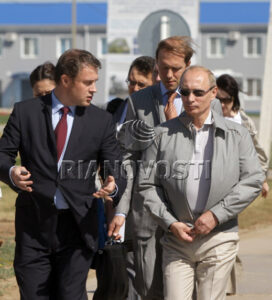
Vladimir Putin visits a EuroChem industrial site in the city of Novomorsk in 2010. (Photo: Alexei Druzhinin / RIA Novosti)
According to a letter from NRA director-general Rumen Spetsov to Bivol, EuroChem Bulgaria‘s tax status has now been updated to “company with terminated tax registration”. The letter also says that the company committed 2 administrative violations in the interval 2017-2021, during which time it was subject to a total of 26 tax inspections.
On 10 March 2022 EuroChem announced in a press release that due to the EU sanctions Andrey Melnichenko was resigning from their board of directors and withdrawing from his position as the main beneficiary.
On 12 March 2022, only three days after the publication of the sanctions list, the Italian police seized Melnichenko’s superyacht worth 400 million euros and considered to be among the biggest in the world, Reuters reports (see video at the bottom).
On 5 May 2022 international investigative website Forensic News published an article about the presence of former US President Donald Trump‘s fundraiser Bill White at parties on Melnichenko’s yacht.
Sofia in stubborn denial of sanctions against Assad
In 2019 deputy economy minister Lilia Ivanova, part of the team appointed by minister Emil Karanikolov, considered by ex-prime minister Boyko Borissov himself as linked to Delyan Peevski, wrote an official letter (seen by Bivol) to one of the Bulgarian importers to the effect that phosphates from Syria were not subject to EU sanctions.
On 24 February 2022 deputy foreign minister Velislava Petrova replied to Bivol that the Ministry of Foreign Affairs was “responsible only for limitations on travel access”.
«Кровавая» торговля: как устроены поставки сирийских фосфатов в Европу
The Ministry of the Economy and Industry and the acting Bulgarian ambassador in Damascus declined answering our questions, saying that the enforcement of sanctions was outside their area of competence.
In March 2022 deputy prime minister and minister of finance Assen Vassilev forwarded Bivol’s inquiry to the Customs Agency’s director-general Pavel Tonev.
Under the requirements of the Access to Public Information Act he informed Bivol that the agency “is not an enforcement body and does not directly participate in the decision-making on customs policies” but would attach a comprehensive chart listing all phosphate importers into Bulgaria (see below).
“Among the bans and restrictions there are some that concern the export and import of certain goods listed in the annexes to Regulation No 36/2012 but for the time period of the implementation of the quoted legal acts there has not been any active ban on the import of phosphates, such as there is for example on the import of crude oil and petroleum products (art. 6 of Regulation (EU) No 36/2012), or on the import of Syrian cultural property goods and other goods of archaeological, historical, cultural, rare scientific or religious importance (art. 11C of Regulation (EU) No 36/2012),” the NRA’s reply continues.
Oligarchs close to Putin and Yanukovych help out Bashar Assad with the phosphates
Under our joint OCCPR investigation journalists from several countries found that Stroytransgaz, owned by Russian billionaire Gennadiy Timchenko, who is sanctioned in the EU and USA because of his close ties to Gazprom and Vladimir Putin, was personally granted the licenses and concession rights needed to mine phosphates by Bashar Assad himself.
In 2010 Timchenko’s company specializing in international trade in electricity Gunvor Group was mentioned by the Bulgarian state regulator EWRC among the applicants for a license to trade electricity on the Bulgarian market.
At the same time imports from Ukraine are operated by a number of companies around Ukrainian oligarch Dmytro Firtash, linked to former president Victor Yanukovych, who was overthrown as a result of the Maidan protests. Firtash himself has been living in Vienna since 2014.
Suspiciously opaque phosphate imports are also carried out by companies in neighbouring Serbia, Italy, and Poland.
A spokesperson for the EU commented for the OCCRP that it was up to individual countries to decide for themselves if the import of Syrian phosphates was a breach of sanctions. Italian authorities refused to comment. When approached before the Russian invasion, Ukraine’s foreign ministry told OCCRP that import did not breach the sanctions regime as the contracts were not signed directly with Stroytransgaz.

Photo: Russia’s intervention in the war in Syria secured its control over the country’s phosphate deposits (photo: The Peninsula Qatar)
Syrian economist Karam Shaar is convinced that the phosphates trade is the perfect demonstration of how easily sanctions can be circumvented by opaque supply chains or by channeling funds and goods through the unknown subsidiaries of targeted companies. :
„Of course the export of phosphates to Europe is a violation of sanctions“.
„But most of the countries don’t understand the structure of the organizations they have sanctioned,” Shaar explains.
“Кървава” търговия: Поглед отвътре към потайните вериги за доставка на фосфати в Европа
The methods used to dodge sanctions in Syria would likely help Russian companies avoid new sanctions imposed by the European Union and the United States over the Ukraine war, says Ibrahim Olabi, a Syrian legal expert who has been monitoring sanctions evasion for years.
“The Syrian phosphates trade shows why the EU sanctions system is not fit for purpose.“
“Sanctions evasion works and is not even that difficult”, Olabi concludes.
Find out more about the results of the OCCRP investigation, where investigative reporting website Bivol is a partner on the Bulgarian side:
“A ‘Bloody’ Trade: Inside the Murky Supply Chain of Syrian Phosphates into Europe “
See chart on the import of phosphates to Bulgaria in 2013-2022 (Source: Bivol, NRA):
| Import of goods (regime 40), phosphates* originating from the Syrian Arab Republic
1 January 2013 – 11 March 2022 |
|||||
| Year | Month | Date | Importer (name) | Customs office | Ship name |
| 2013 | January | 7.01 | AFER BULGARIA EOOD | Varna West | ABDULB |
| 28.01 | AFER BULGARIA EOOD | Varna West | RAKANM | ||
| February | 3.02 | AFER BULGARIA EOOD | Varna West | ASRAY | |
| 8.02 | AFER BULGARIA EOOD | Varna West | RASHASTAR | ||
| 10.02 | AFER BULGARIA EOOD | Varna West | ABDOULRAHMANB | ||
| 12.02 | AFER BULGARIA EOOD | Varna West | LADYLEEN | ||
| March | 7.03 | AFER BULGARIA EOOD | Varna West | SURAYAY | |
| 12.03 | AFER BULGARIA EOOD | Varna West | RASHAB | ||
| April | 5.04 | AGROPOLYCHIM AD | Varna West | NADAY | |
| 24.04 | AGROPOLYCHIM AD | Varna West | THRUSTWORTHY | ||
| June | 26.06 | AGROPOLYCHIM AD | Varna West | ABDULB | |
| July | 26.07 | AGROPOLYCHIM AD | Varna West | JAMILG | |
| August | 13.08 | AGROPOLYCHIM AD | Varna West | PRINCESSMARIA | |
| September | 25.09 | AGROPOLYCHIM AD | Varna West | JAMILG | |
| October | 3.10 | AGROPOLYCHIM AD | Varna West | LADYNADAY | |
| November | 9.11 | AGROPOLYCHIM AD | Varna West | ABDULB | |
| 20.11 | AGROPOLYCHIM AD | Varna West | RASHAB | ||
| 25.11 | AGROPOLYCHIM AD | Varna West | ABBOUDG | ||
| December | 13.12 | AGROPOLYCHIM AD | Varna West | PARISY | |
| 21.12 | AGROPOLYCHIM AD | Varna West | RASHAB | ||
| 27.12 | AGROPOLYCHIM AD | Varna West | SURAYAY | ||
| 2014 | January | 2.01 | AGROPOLYCHIM AD | Varna West | ABDOULRAHMANB |
| 4.01 | AGROPOLYCHIM AD | Varna West | ASRAY | ||
| 22.01 | AGROPOLYCHIM AD | Varna West | ZARA | ||
| 24.01 | AGROPOLYCHIM AD | Varna West | JAMILG | ||
| February | 9.02 | AGROPOLYCHIM AD | Varna West | PARISY | |
| 15.02 | AGROPOLYCHIM AD | Varna West | MARWANA | ||
| March | 2.03 | AGROPOLYCHIM AD | Varna West | NADAY | |
| 8.03 | AGROPOLYCHIM AD | Varna West | ARMORY | ||
| 12.03 | AGROPOLYCHIM AD | Varna West | ZARA | ||
| 15.03 | AGROPOLYCHIM AD | Varna West | TRUSTWORTHY | ||
| April | 1.04 | AGROPOLYCHIM AD | Varna West | LADYLEEN | |
| 13.04 | AGROPOLYCHIM AD | Varna West | ARMORY | ||
| May | 15.05 | AGROPOLYCHIM AD | Varna West | RAKANM | |
| 28.05 | AGROPOLYCHIM AD | Varna West | ZARA | ||
| July | 28.07 | AGROPOLYCHIM AD | Varna West | HAMOUDIB | |
| August | 9.08 | AGROPOLYCHIM AD | Varna West | ZARA | |
| 14.08 | AGROPOLYCHIM AD | Varna West | LUNA | ||
| 22.08 | AGROPOLYCHIM AD | Varna West | ARMORY | ||
| September | 2.09 | AGROPOLYCHIM AD | Varna West | SURAYAY | |
| 10.09 | AGROPOLYCHIM AD | Varna West | OMARB | ||
| November | 30.11 | AGROPOLYCHIM AD | Varna West | SEASHARK | |
| December | 16.12 | AGROPOLYCHIM AD | Varna West | OMARB | |
| 2015 | January | 30.01 | AGROPOLYCHIM AD | Varna West | LADYNOUR |
| March | 01.03 | AGROPOLYCHIM AD | Varna West | SIREENB | |
| 09.03 | AGROPOLYCHIM AD | Varna West | TRUSTWORTHY | ||
| 23.03 | AGROPOLYCHIM AD | Varna West | ARMORY | ||
| 30.03 | AGROPOLYCHIM AD | Varna West | MARWANA | ||
| April | 30.04 | AGROPOLYCHIM AD | Varna West | OMARB | |
| May | 30.05 | AGROPOLYCHIM AD | Varna West | OMARB | |
| June | 02.03 | AGROPOLYCHIM AD | Varna West | HAMOUDI | |
| 2021 | April | 24.04 | FERTIX EOOD | Varna West | LEOI |
| June | 09.06 | FERTIX EOOD | Varna West | SEAEAGLE | |
| 25.06 | FERTIX EOOD | Varna West | FORTUNA | ||
| 2022 | February | 26.02 | FERTIX EOOD | Varna West | NANALEEN |
| *The data presented hereby is applicable to tariff position 251020 (Natural calcium phosphates, natural aluminium calcium phosphates and phosphatic chalk, ground) | |||||
Public information as per item 2, request # 32-71572/02.03.2022
| Import (Regime 40) of phosphates* originating from the Syrian Arab Republic
in April and June 2021 |
||
| Year/Month | 2021 | |
| April | June | |
| Net weight (kg) | 5 149 497 | 20 461 254 |
***
If you find this article useful, support our work with a small donation.
Pay a Bivol Tax!
We will highly appreciate if you decide to support us with monthly donations keeping the option Monthly
IBAN: BG27 ESPY 4004 0065 0626 02
BIC: ESPYBGS1
Титуляр/Account Holder: Bivol EOOD

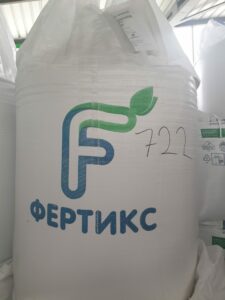





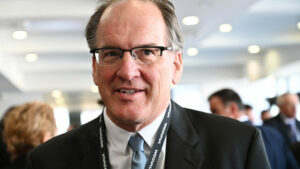

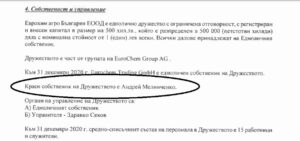


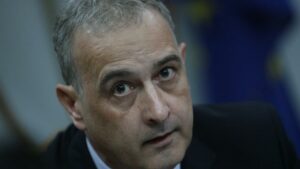










You must be logged in to post a comment.